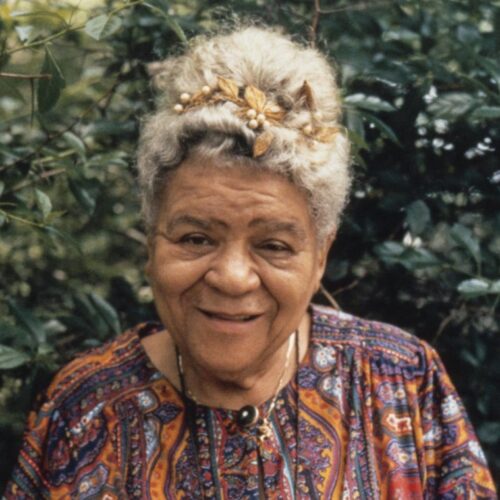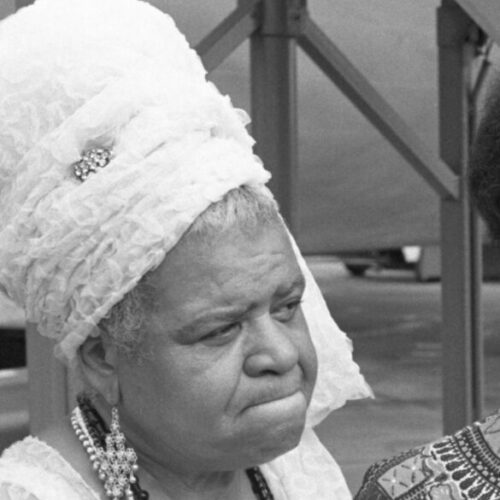Biography
Audley “Queen Mother” Moore advocated for Black liberation and is the mother of the modern reparations movement.
Audley Moore was born on July 27, 1898, in New Iberia, Louisiana to Ella and St. Cry Moore. When Audley was five years old, her mother died in childbirth and her father brought her and her two younger sisters to New Orleans.
The girls attended St. Catherine’s Catholic School but when her father died, Moore left school in the fourth grade to take care of her sisters. As a teen, she pretended to be twenty-one to take a hairdressing course and better support herself and her sisters. Moore left the Catholic Church when the Pope supported the Italian invasion of Ethiopia. She joined other religions to “affiliate with everything and everybody my people belonged to.” She helped found the Ethiopian Orthodox Coptic Church of North and South America.
Early Activism
As World War I broke out, Moore’s sister, Eloise, told her the Red Cross provided coffee and donuts to the white soldiers but gave nothing to the Black soldiers. In response, Moore and her sisters solicited donations of coffee from their neighbors to give to the Black soldiers.
When the sisters learned the troops were being sent to Alabama, they followed the troops to provide the Black soldiers with the same hospitality enjoyed by the white soldiers.
After the war, Moore returned to New Orleans. In 1919, at twenty-one years old, Moore first heard the Black Nationalist Marcus Garvey speak.
In an interview later, Moore says that “It was Garvey who brought the consciousness to me.” In another interview, Moore elaborates: “He [Garvey] made us conscious of the fact that we belong to a big continent…That we were somebody. That we had a right to be restored to our proper selves.”
Moore was active in the Garveyite movement, known as the Universal Negro Improvement Association (UNIA), and it was during that time she learned and grew in her own pan-African sensibilities.
Moore was an active member of the Harlem Communist Party from the early 1930s until around 1950.
Social Advocacy and Reparations
Moore spent the rest of her life advancing the cause of freedom for her people in the United States and around the world.
One of the many movements she was at the center of was the African-American Cultural Foundation, where she both founded and served as president. This organization advocated that instead of being known as “Negroes” Black people should be called “Africans.” For Moore, such a change was conducive to the freedom of self-naming or self-determination for people of African descent.
Moore was a staunch and fierce warrior for reparations. She formed the Universal Association of Ethiopian Women in 1957. This organization successfully fought to return 23,000 Black families to the welfare rolls in Louisiana; a fight Moore saw as a form of reparations. That year Moore presented a reparations petition to the United Nations.
Moore published an extensive rationale on reparations and implementation, which went beyond cash payouts to encompass greater economic impact. In 1962, Moore organized the Reparations Committee for the Descendants of American Slaves (RCDAS).
Global Leadership
By the 1970s and 1980s, Moore’s work went on to have a global impact. In 1972, she spoke at the All-Africa Women’s Conference and at the Sixth Pan-African Conference, both in Dar es Salaam, Tanzania.
In 1985, Moore was initiated as Queen Mother of the Ashanti Tribe for her long life of activism. As late as 1995, Moore still was active, appearing at The Million Man March.
Audley Moore’s activism sprung from her love for African American people and her desire for their thriving physically and intellectually.
In speaking about the topic in an interview, Moore said, “I think it’s necessary to understand, very necessary to understand the nature of our oppression and our status in the United States as a captive people.”
Moore understood that activism requires not only resisting whatever acts of oppression are being committed but also an awakening of the mind to the inherent dignity one possesses as a Black person. She said: “I have one objective, win ‘em for freedom”


